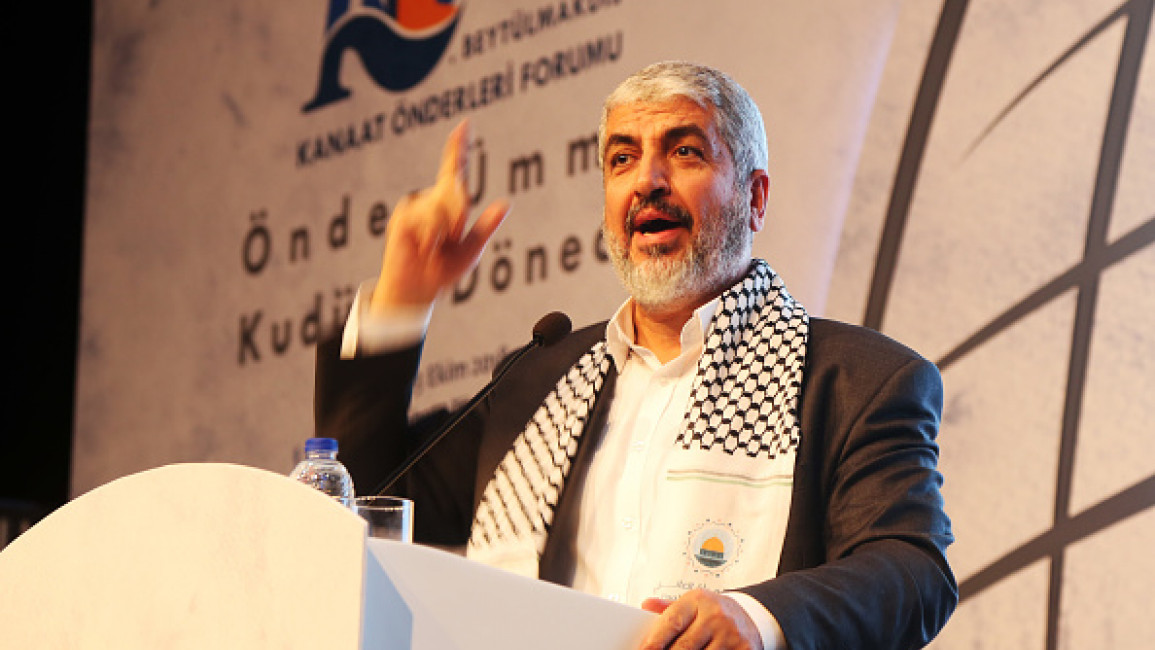Hamas's Meshaal calls on Moroccans to pressure king to end Israel normalisatiion
Former Hamas leader Khaled Meshaal has called on Moroccans to pressure King Mohammed VI to end his country's normalisation deal with Israel over the Gaza war.
Meshaal was among a group of speakers invited virtually to a 'political festival' organised in Rabat by the Islamist Unification and Reform group, which is affiliated with the moderate Islamist Justice and Development (PJD) party.
In his speech, Meshaal called on the Moroccan people to take to the streets to demand an Israeli office in Rabat be closed and that normalisation with Israel is revoked.
"Morocco can correct its mistake and perform a duty," the Hamas figure said in the virtual address on Sunday.
"I call on my brothers in Morocco, the Islamist movement, and all the political parties to call on the state's leadership (to revoke the normalisation) for the good of Morocco... and Palestine... such move will convince the West and the US to revise their position."
#أؤيد_دعوة_مشعل 🇵🇸🇲🇦 pic.twitter.com/RQLABP1giZ
— الرادع المغربي 🇲🇦🇵🇸 (@Rd_fas1) November 20, 2023
The Hamas leaders have maintained good ties with the PJD party despite its role in signing the normalisation deal with Israel in 2020.
A few weeks after shaking hands with Israeli officials in Rabat, Saad Dine El-Otmani, Morocco's prime minister at the time, hosted Hamas Chief Ismail Haniyeh in Morocco to highlight the PJD's support for the Palestinian cause and win back voters' trust.
After losing the elections in 2021, El-Otmani said he was under pressure to sign the deal. He described the moment he sat with former US President Donald Trump's Middle East adviser Jared Kushner and former Israeli National Security Adviser Meir Ben-Shabbat as "painful and difficult".
’I support Mashal speech’
As the Palestinian leader's speech went viral, thousands of Moroccans took to social media posting under the hashtag “I support Mashal speech.”
"Yes, severing relations with the enemy, and ending normalisation, is in the interest of the Moroccan state and people, before Palestine," wrote Moroccan journalist Abdessamad Benaabad.
"Yes, I support Meshaal's call... [it] can only be opposed by a traitor to his homeland, an agent of the enemy, who threatens the homeland in its unity and stability."
Since the eruption of the Gaza war on 7 October, thousands of Moroccans have marched weekly in the kingdom’s major cities brandishing Palestinian flags and even dressing as Hamas's controversial spokesperson Abu Obeidah.
While pro-Palestine feelings have remained strong among the Moroccan people, three years after a normalisation deal was signed, the Gaza war has triggered unprecedented rallies and demonstrations.
"We were silent. Everyone was afraid. Now it's time to speak up, everyone," Nabila Mounib, head of the opposition socialist party, told The New Arab on 15 October in Rabat.
'Meshaal, like Macron, disrespected Morocco's sovereignty'
Some Moroccans were offended by Meshaal's speech, questioning the leader's "interference with the Moroccan internal affairs and disrespect of its sovereignty", using the hashtag "only the king addresses his people".
In a caricature, one X user likened Meshaal's calls to protest to the actions of French President Emmanuel Macron in September, when he addressed the Moroccan people directly when Rabat turned down Paris's offer to help deal with a devastating earthquake.
Some pro-state media have also slammed the Hamas leader for his attempt to ignite “strife in Morocco”.
No Moroccan official has reacted yet to the controversial speech.
جميعهم إلى المزبلة ...#المغاربة_لا_يخاطبهم_إلا_ملكهم pic.twitter.com/OnOg61g6hS
— الشريف الإدريسي (@AshryfIdrissi) November 21, 2023
Rabat has so far maintained a neutral position on the Gaza war condemning violence on both sides, despite local activists’ calls for a tougher line against Israel.
According to Israeli and Moroccan media, on Wednesday, 18 October, the Israeli representative in Morocco was reportedly evacuated to Israel along with other Israeli officials who were working at the liaison office in Rabat.
Local Pro-Palestine groups in Morocco are vowing to continue protests until the government closes an Israeli liaison office and annuls the normalisation deal with Tel Aviv.



